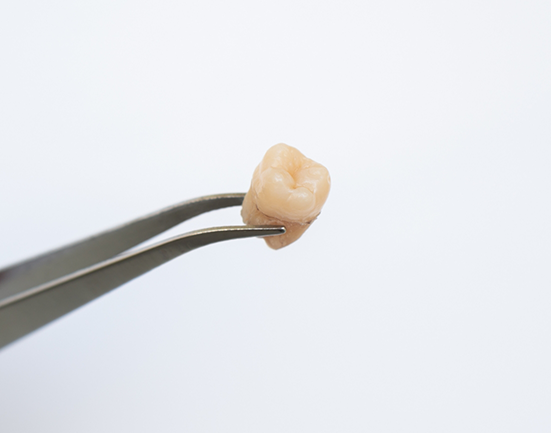Tooth Extractions Frisco
No More Tooth Pain, Only Healthy Smiles

When trying to save your oral health from further decline, Dr. Gadhiya might recommend tooth extractions in Frisco. This essential form of treatment may not be the first thing he suggests when trying to treat your problem tooth; however, if other restorative solutions remain unsuccessful, removing the tooth may be the only possible option. If you are concerned about your oral health and would like a dental expert to take a look, contact our office to schedule an appointment today.
Why Choose Highland Oak Dental for Tooth Extractions?
- Nitrous Oxide, Oral Conscious & IV Sedation Available
- Patient Comfort & Safety Are a Priority for Our Dental Team
- In-House Dental Implant Placement & Restoration Provided
The Tooth Extraction Procedure

Primarily, there are two types of extractions:
- A simple one (sometimes called closed extraction) is a type of oral surgery that is performed when the permanent tooth can be seen in the mouth. It is a straightforward process that uses an instrument called an elevator to rock the tooth back and forth and forceps to grab the tooth and extract it.
- A surgical one (sometimes referred to as open extraction) is a more complicated procedure. This is usually performed when the teeth have broken off and are below the gumline. Surgical procedures are also performed if the tooth hasn’t come out yet. Oral surgeons normally perform surgical removals, but it isn’t restricted to them, as dentists can perform them as well. During the extraction process, the oral health practitioner will make a small incision in the gums to reveal the tooth. Sometimes, they may need to remove some of the bone around it and separate it into pieces so it can be pulled out easily.
An injection (a local anesthetic) is standard in simple extractions, but sometimes, you can request sedation that will help you relax when you’re anxious or nervous about the procedure. For surgical extractions, you’ll receive a local anesthetic that is injected into your vein (intravenous). If you receive conscious sedation, you may be provided with steroids or other medicines in the IV line.
During the tooth extraction, you might feel pressure but no pain.
Tooth Extraction FAQs
How long does it take to recover from a tooth extraction?
Normally, your oral surgeon will ask you to rest and relax for 48-72 hours after tooth extraction to promote a blood clot. Once the blood fully clots, you should be able to resume normal activity. However, for the extraction to fully heal, particularly in your gum tissues, it takes three to four weeks. Consult Dr. Prakash Gadhiya to know more about recovery from tooth extractions. He has numerous years of professional experience, is an expert in a variety of dental procedures, and is well-equipped.
Is removing a tooth painful?
When it comes to removing a tooth, you may feel slight pressure, but that’s common. The affected tooth is rocked back and forth to loosen it before removal, which is the pressure you are feeling. Our caring team at Highland Oak Dental will make sure you don't feel any pain during the extraction, cater to your specific dental needs, guarantee to improve your dental health, and help you attain a healthy, radiant smile.
How long after a tooth extraction can I eat?
You should only eat soft foods and liquids for 24 hours after the extraction. You can transition to your regular diet after several days or when you feel comfortable doing so.








